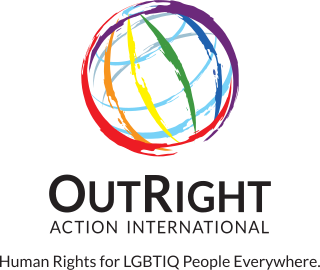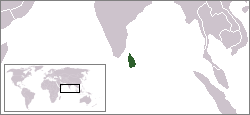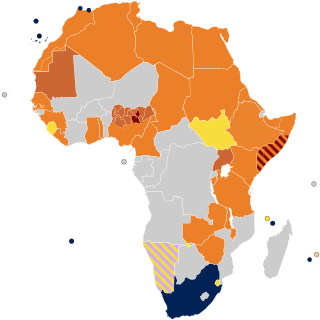Related Research Articles

Lesbian, gay, bisexual, transgender and queer (LGBTQ) movements are social movements that advocate for LGBTQ people in society. Although there is not a primary or an overarching central organization that represents all LGBTQ people and their interests, numerous LGBT rights organizations are active worldwide. The first organization to promote LGBT rights was the Scientific-Humanitarian Committee, founded in 1897 in Berlin.

Societal attitudes toward homosexuality vary greatly across different cultures and historical periods, as do attitudes toward sexual desire, activity and relationships in general. All cultures have their own values regarding appropriate and inappropriate sexuality; some sanction same-sex love and sexuality, while others may disapprove of such activities in part. As with heterosexual behaviour, different sets of prescriptions and proscriptions may be given to individuals according to their gender, age, social status or social class.

Opposition to legal rights for lesbian, gay, bisexual, and transgender (LGBTQ) people exists throughout the world. LGBT rights opponents may be opposed to the decriminalization of homosexuality; laws permitting civil unions or partnerships or supporting LGBT parenting and adoption, LGBT military members, access to assisted reproductive technology, and access to sex reassignment surgery and hormone replacement therapy for transgender individuals.

Lesbian, gay, bisexual, and transgender (LGBT) rights in Cuba have significantly varied throughout modern history. Cuba is now considered generally progressive, with vast improvements in the 21st century for such rights. Following the 2022 Cuban Family Code referendum, there is legal recognition of the right to marriage, unions between people of the same sex, same-sex adoption and non-commercial surrogacy as part of one of the most progressive Family Codes in Latin America. Until the 1990s, the LGBT community was marginalized on the basis of heteronormativity, traditional gender roles, politics and strict criteria for moralism. It was not until the 21st century that the attitudes and acceptance towards LGBT people changed to be more tolerant.

OutRight International (OutRight) is an LGBTIQ human rights non-governmental organization that addresses human rights violations and abuses against lesbian, gay, bisexual, transgender and intersex people. OutRight International documents human rights discrimination and abuses based on their sexual orientation, gender identity, gender expression and sex characteristics in partnership with activists, advocates, media, NGOs and allies on a local, regional, national and international level. OutRight International holds consultative status with ECOSOC.
Rosanna Flamer-Caldera is a Sri Lankan LGBTIQ rights activist. She is the founder and executive director of EQUAL GROUND, the oldest LGBTIQ advocacy organisation pursuing LGBTIQ rights as part of the larger Human Rights framework in Sri Lanka. She was also the co-founder of the Women’s Support Group in 1999. Rosanna served as the first Sri Lankan Female Asia Representative (2001-2003) and then Co-Secretary General of the International Lesbian, Gay, Bisexual, Transgender and Intersex Association (ILGA) (2003-2008). She is the co-founder and former Chair of the Commonwealth Equality Network (2015-2022), a broad network of LGBTIQ organisations within the Commonwealth. In September 2021, she spearheaded the first of its kind legal case in the Sri Lanka Court of Appeals, against homophobic, discriminatory and inflammatory speeches made by police trainers in Sri Lanka. The police issued an island wide circular to all police stations in the country that stated that LGBTIQ persons could not be arrested or harassed for being who they are. Through her guidance, in 2015 EQUAL GROUND commenced Diversity Equity and Inclusion programs within the corporate sector and to date has sensitised over 45000 staff members of over 50 companies in Sri Lanka. In 2017 she received the Zonta award for Social Impact and in November 2022, she received the APCOM Community Hero award for her work for the LGBTIQ community in Sri Lanka.

Lesbian, gay, bisexual, and transgender (LGBT) people in Sri Lanka face significant challenges not experienced by non-LGBT residents.

Lesbian, gay, bisexual, and transgender (LGBT) rights in Africa are generally poor in comparison to the Americas, Western Europe and Oceania.
LGBT migration is the movement of lesbian, gay, bisexual and transgender (LGBT) people around the world or within one country. LGBT individuals choose to migrate so as to escape discrimination, bad treatment and negative attitudes due to their sexuality, including homophobia and transphobia. These people are inclined to be marginalized and face socio-economic challenges in their home countries. Globally and domestically, many LGBT people attempt to leave discriminatory regions in search of more tolerant ones.
This is a timeline of notable events in the history of non-heterosexual conforming people of South Asian ancestry, who may identify as LGBTIQGNC, men who have sex with men, or related culturally-specific identities such as Hijra, Aravani, Thirunangaigal, Khwajasara, Kothi, Thirunambigal, Jogappa, Jogatha, or Shiva Shakti. The recorded history traces back at least two millennia.
Anjaree was an LGBT rights organization in Thailand. It formed as a lesbian organization in 1986 and has focused on issues such as reforming the words used to refer to same sex desire and campaigning for same sex marriage to be legally recognised. It became dormant around 2015.

Equal Ground is a non-profit advocacy organization based in Colombo, Sri Lanka, that campaigns for political, social and civilian rights for lesbian, gay, bisexual, transgender (LGBT), intersex and queer individuals. The organization, established in 2004, is one of the first organization in Sri Lanka welcoming and advocating equality for people of all sexual orientations and gender identities.
Tamil sexual minorities are Tamil people who do not conform to heterosexual gender norms. They may identify as LGBTQIA. It has been estimated that India has a population of 2.5 million homosexuals, though not all of them are Tamil, and not all Tamils live in India.
Sexual minorities in Sri Lanka have been counted in recent times as consisting of as little as 0.035% of the population to as high as 19.6%. It is likely that there are around 1,100,000 according to current mapping conventions.
The history of sexual minorities in Sri Lanka covered in this article dates back to a couple of centuries before the start of the Vikram Samvat era, although it is highly likely that archaeology predating this period exists. There are virtually zero historical records of sexual minorities in the Latin script dating prior to colonialism. The concept of Sri Lanka did not exist prior to colonialism, and the term 'lanka' translates to 'island'.

Homosexuality in Sri Lanka has been documented since ancient times. Since the 17th century, homosexual intercourse has de jure prohibited through the Penal Code first implemented under the colonialism, but human rights organizations write that arrests are rare and prosecutions only relate to non-consensual sex and prostitution.
Rauda Morcos is a Palestinian Israeli lesbian poet and LGBTQ activist, whose hometown is in Northern Israel, living in Haifa in Israel. In 2003, she was outed as a lesbian by a national newspaper, leading to dismissal from her job, physical assaults, and her car being damaged. She then helped other women in setting up Aswat in Israel, the first Palestinian group dedicated to supporting lesbians, which she initially led.
Sherman de Rose is a Sri Lankan LGBT activist. He grew up in Kotahena. As a young person, he wanted to join the Catholic church and studied in Ireland, but he left the church after realizing he was gay. Then, he set up Companions on a Journey, Sri Lanka's first gay rights group, in 1994.
The Women's Support Group (WSG) is a Sri Lankan organisation dedicated to helping lesbian, bisexual and transgender women. It was set up in 1999 by amongst others Rosanna Flamer-Caldera. It has won the Felipa de Souza Award twice.

GALZ An Association of LGBTI People in Zimbabwe is an organisation established in 1990 in Harare to serve the needs of the lesbian, gay, bisexual, transgender and intersex (LGBTI) community in Zimbabwe. GALZ's vision is "a just society that promotes and protects human rights of LGBTI people as equal citizens in Zimbabwe".
References
- 1 2 Baxter, Louise (29 October 2002). "Point of view: "Fundamental human rights for all" demands ILGA". Daily News. Sri Lanka. Archived from the original on 26 July 2020. Retrieved 26 July 2020.
- 1 2 3 4 Tahmindjis, Phillip (2014). Sexuality and Human Rights: A Global Overview (eBook). Routledge. ISBN 978-1-134-73264-7 . Retrieved 26 July 2020.
- ↑ Samath, Feizal (27 July 2009). "RIGHTS-SRI LANKA: Gay Community Takes Heart in Indian Court Ruling". IPS News. Archived from the original on 26 July 2020. Retrieved 26 July 2020.
- ↑ "Ethnic Conflict". Lines. 2. Social Scientists' Association: 39. 2003.
- ↑ UNHCR (27 November 2000). "Sri Lanka: Treatment of homosexual men by the authorities, the Muslim community, and the broader community; laws proscribing homosexual acts and whether they are applied in practice (1997 – November 2000)". Refworld. United Nations High Commissioner for Refugees. Archived from the original on 26 July 2020. Retrieved 27 July 2020.
- ↑ "Gay groups respond to disaster". Star Observer. 20 April 2008. Archived from the original on 26 July 2020. Retrieved 26 July 2020.
- ↑ "Sri Lanka's gays share their journey". BBC News. 20 May 2005. Archived from the original on 1 September 2017. Retrieved 26 July 2020.
- ↑ Karunaratna, Vicramabahu (21 December 2008). "Lesbians and gay joining to establish classless society". Sri Lanka Guardian. Archived from the original on 26 July 2020. Retrieved 26 July 2020.
- ↑ UNHCR, United Nations High Commissioner for (21 December 2012). "UNHCR Eligibility Guidelines for Assessing the International Protection Needs of Asylum-Seekers from Sri Lanka". Refworld. United Nations High Commissioner for Refugees. pp. 35–36. Archived from the original on 26 July 2020. Retrieved 27 July 2020.
- ↑ "Awards 2018". OutRight Action International. 16 January 2018. Archived from the original on 26 July 2020. Retrieved 26 July 2020.